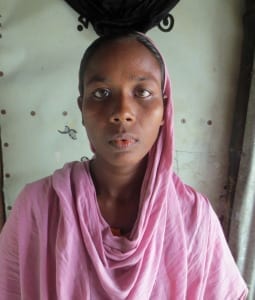
Aferza, 25, received no compensation after being seriously injured in the Tazreen Fashions factory fire and suffers from constant pain. Credit: Solidarity Center
To mark the one-year anniversary of the deadly Tazreen Fashions factory fire in Bangladesh, the Solidarity Center is highlighting stories of survivors and their families.
Aferza, 25, left her village in 2010 for Dhaka, the Bangladesh capital, to escape poverty. She planned to help support her family and educate her children with the money she earned.
On November 24, 2012, she was working as a sewing operator on the fourth floor of the Tazreen Fashions Ltd., garment factory when a fire swept through the building. Like nearly all workers who escaped the blaze, she was forced to jump from a window because the building had no fire escapes. Her husband found her lying unconscious among dead bodies near the burning building.
Her skull was fractured and a broken chest bone punctured her lung. Now, she says, “I am unable to take a glass of water on my own. I cannot sit or lie down for very long. I feel intolerable pain in my whole body and cry constantly.”
Unable to work, she sold the small plot of land she owned in her home village to help pay for medical expenses and food for her family. She spent the compensation she received from the Bangladesh Garments Manufacturing and Exporting Association (BGMEA) and Caritas, a private, Jesuit-run organization, for her medical treatment. “Living here with my husband and children, I cannot contribute to the maintenance of my family,” she says. “My husband is a rickshaw puller whose poor income cannot cover all these costs. Almost all of his earnings are spent on the cost of my medicine.”
As a result, she said, “I starve with my kids and cannot buy medicine for me.”
Some 112 workers died in the Tazreen blaze, which began in a first-floor warehouse of the multistory building. Like other Tazreen garment workers who recounted their experiences to Solidarity Center staff, Aferza says the production manager told them to remain at their work stations, despite the ringing fire alarm. She remembers the lights going out after the fire alarm and falling on the floor as panicked workers ran toward the windows. A co-worker helped her up to a window, where she jumped to the ground.
Even as she suffers from relentless physical pain, Aferza has also been psychologically wounded, fearful of tall buildings and crowds.
With no compensation from the government, the international buyers or the factory owner—and no way to go to work again—Aferza is depending upon loans for her medical treatment. “I have nothing,” she says. “I don’t know how I will survive in the coming days.
“My only dream is now to have food three times in a day, get better treatment and educate my children.”
